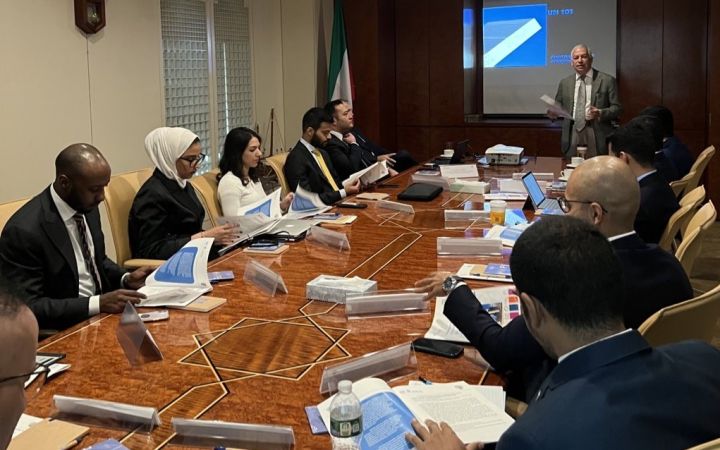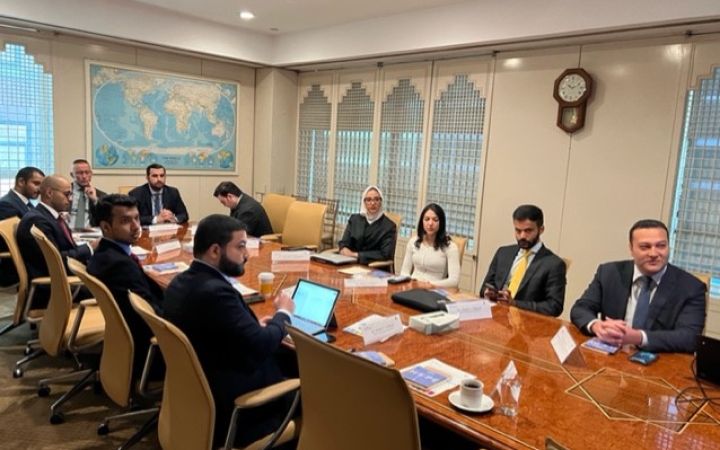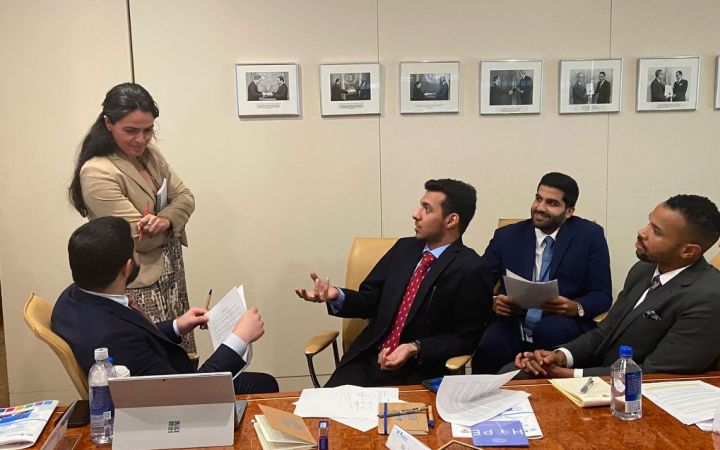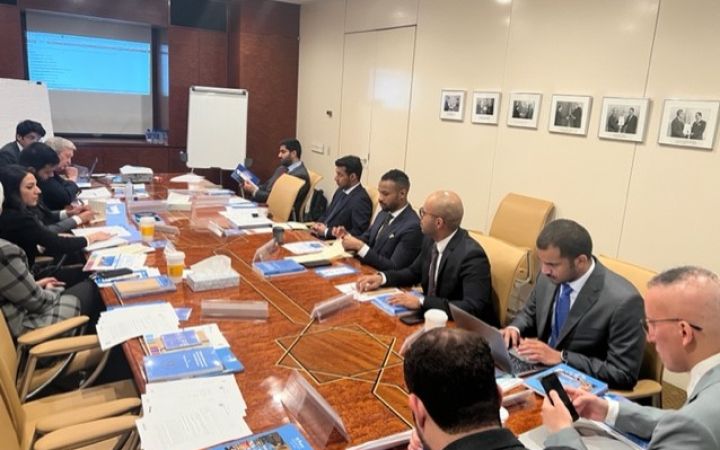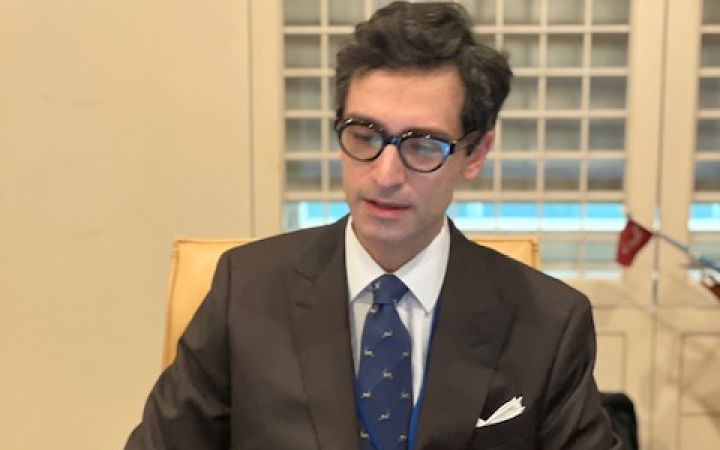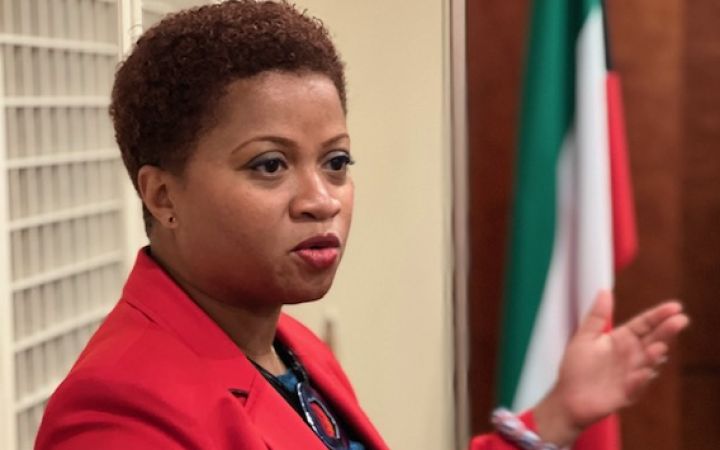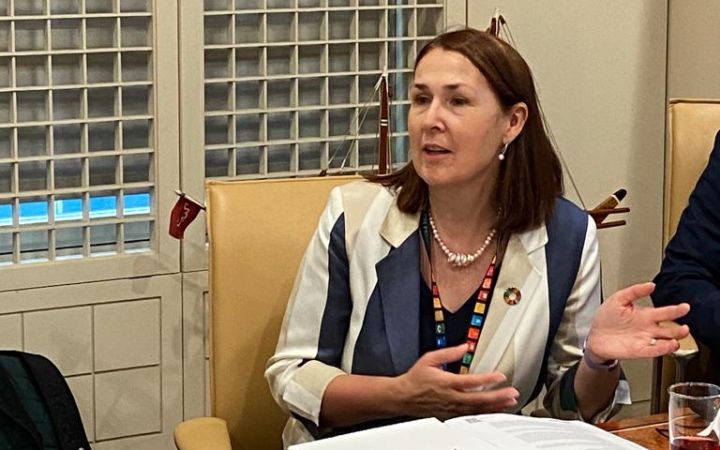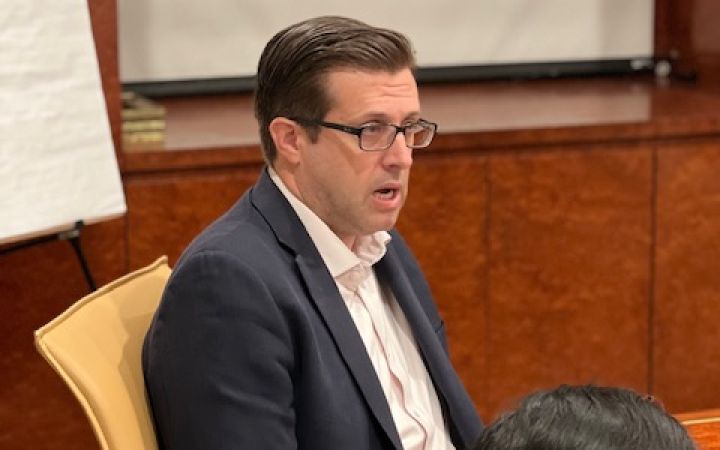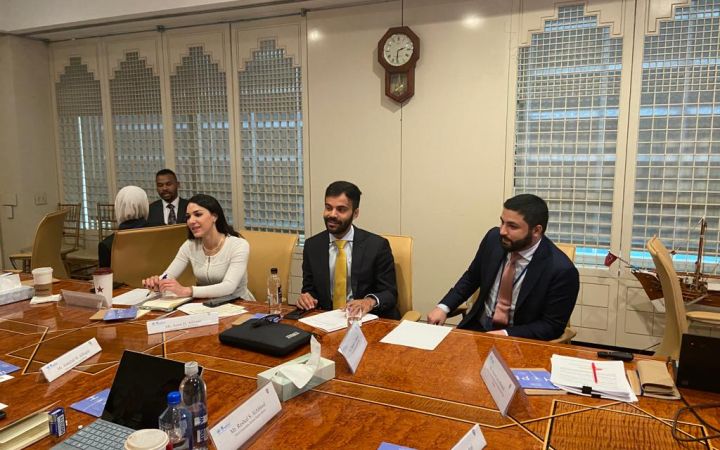27-30 September, New York, USA – The United Nations Institute for Training and Research (UNITAR) New York Office developed the Strengthening Knowledge and Skills in Multilateral Diplomacy Induction Course for Kuwaiti diplomats. The private course, attended by 13 delegates, was designed to enhance the performance of diplomats from the Permanent Mission of Kuwait to the United Nations.
The first day of the training started at 10:00 AM (EST). Mr. Marco Suazo, Head of the UNITAR New York Office, welcomed the Kuwaiti delegates and Mr. Angel Angelov, former Deputy Representative of Bulgaria to the United Nations and Consul General. Mr. Angelov gave an overview of the United Nations System to help delegates achieve a better understanding of the UN. He also discussed the functions and powers of the main organs of the UN as well as the main UN players. He then helped delegates understand the main dynamics associated with the “Arab Swing Seat” in the UN Security Council.
The first day ended with a Multilateral Negotiations session led by Ms. Jimena Leiva-Roesch, Director of Global Initiatives at the International Peace Institute. Through an exercise, Ms. Leiva-Roesch helped delegates understand multilateral negotiations as well as learn and apply negotiation tactics. The exercise also aimed at increasing delegates' awareness of current power dynamics.
The second day of the training programme began with an overview of drafting resolutions, rules and procedures presented by Mr. Larry Johnson, Former Assistant Secretary-General for the Office of Legal Affairs. Mr. Johnson explained the process related to drafting resolutions and key elements to produce the best drafts. He emphasized the importance of using the right language and determining whether a specific country's vote is really needed. He also explained the submission procedure once resolutions are complete.
The afternoon was dedicated to the overview of the Third, Fourth and Fifth Committees' work. Mr. Ziad Mahmassani, Secretary of the Third Committee and Senior Intergovernmental Affairs Officer, explained the Third Committee's work. He discussed the programme of work including interactive dialogues and general debate, documentation and draft proposals, formal and informal meetings, the Bureau's functions and relevant tools including the Third Committee website and the E-deleGATE portal. Ms. Claudia Gross, Deputy Secretary of the Fourth Committee and Intergovernmental Affairs Officer, gave an overview of the Fourth Committee's work. She discussed agenda items and phases of consideration related to them, documentation, the different bodies submitting reports, the voting procedure, the hearing of petitioning on non-self-governing territories (NSGTs) and relevant tools. The day ended with Mr. Ahmed Mohamed Ismail Elmahs, Former Vice-Chair of the Fifth Committee in the 76th Session of the General Assembly, giving an overview of the Fifth Committee's work. He discussed challenges related to budget planning and approval to ensure efficient decision-making.
The following day started with an introduction to networking and personal branding in the diplomatic world, offered by Ms. Michelle Clarke-Ceres, Co-Founder/President, WorldCeres Inc. Executive Career Coach, Soft Skills Trainer - Diversity, Equity, and Inclusion Consultant. She emphasized the importance of practicing efficient communication for self-promotion purposes, practicing etiquette, being strategic with people's behavior. She also discussed salary negotiation and confidence.
The day ended with an overview of the Second Committee's work given by Ms. Emer Herity, Chief of the ECOSOC Affairs Branch of the General Assembly and ECOSOC Affairs (GAEAD), Division of the Department for the General Assembly and Conference Management. She explained the Second Committee's agenda items, organization of work, phases of consideration, working methods, documentation, decision-making and shared relevant tools.
The last day of the training began with a discussion on Non-Proliferation of Nuclear Weapons and Weapons of Mass Destruction, led by Mr. Chris King, Senior Political Affairs Officer, Weapons of Mass Destruction Branch, United Nations Office for Disarmament Affairs, Ms. Marya Canham, Political Affairs Officer, Weapons of Mass Destruction Branch, United Nations Office for Disarmament Affairs and Ms. Danielle McLaughlin, Senior Strategist, Horizon 2045 Legal Strategies. Mr. King gave an overview and historical background of the non-proliferation treaty and nuclear non-proliferation. He also briefly mentioned the UN Resolutions and Conferences regarding disarmament. Ms. Canham discussed Kuwait’s relationship to the NPT and Kuwait’s role in disarmament. She also discussed how to negotiate a treaty to ensure that the Middle East becomes a weapons of mass destruction-free region. Ms. McLaughlin explained the intersectional relationship between disarmament and the SDG’s. She also discussed the hurdles to non-proliferation, while considering domestic/international law and private/public law.
The day ended with an overview of the Sixth Committee, given by Mr. Arnold Pronto, Principle Legal Officer, Codification Division, Office of Legal Affairs. He mentioned the various topics covered by the Sixth Committee, including diplomatic immunity, crimes committed by peacekeepers, sovereignty, cross and transnational borders and maritime boundaries, to name a few. He emphasized the interplay between laws and present issues.


